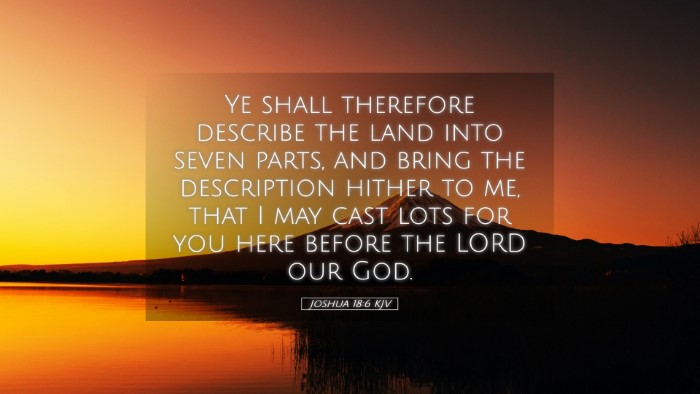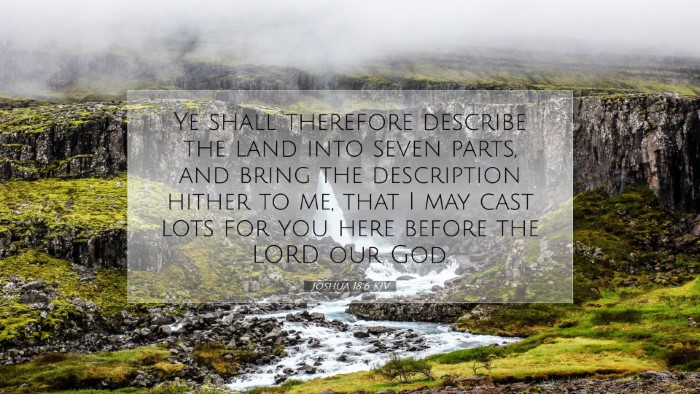Commentary on Joshua 18:6
Joshua 18:6 states: "And ye shall describe the land into seven parts, and bring the description hither to me; that I may cast lots for you here before the LORD our God." This verse marks a pivotal moment in the administrative process of land distribution among the tribes of Israel. Below, we will delve into the various insights drawn from esteemed public domain commentaries.
Contextual Background
After the conquest of Canaan, the allocation of land was essential for the newly formed nation of Israel. Joshua, now a seasoned leader under God's command, was responsible for this critical task. The book of Joshua serves as a bridge between the Exodus experience and the establishment of Israel in Canaan. The distribution of the land was not merely administrative; it was a fulfillment of God's promise to Abraham regarding his descendants.
Insights from Matthew Henry
Henry emphasizes the importance of divine guidance in the process of land distribution. He states:
- Divine Approval: The casting of lots was an act that sought God’s will. Henry notes that seeking divine approval in important decisions is a practice still relevant today. Just as Joshua could not proceed without first consulting God, so should leaders today seek divine wisdom in their endeavors.
- Unity among Tribes: The instruction to describe the land into seven parts underscores the need for unity among the tribes. Division of land was not just about property, but about maintaining the cohesiveness of the people of Israel.
Insights from Albert Barnes
Barnes comments on the procedural aspects of the land division:
- Order and Authority: Barnes emphasizes the orderliness of this process. The command of Joshua to the tribes to describe the land and bring it back to him shows an organized approach that was necessary for the harmonious settlement of the tribes.
- Casting Lots: The act of casting lots was a method used to make decisions believed to be directed by God. Barnes notes that this reflects a reliance on God’s sovereignty in determining the fate of the tribes, reminding modern readers of the necessity of entrusting outcomes to God.
Insights from Adam Clarke
Clarke provides a deeper theological insight into the significance of each tribe’s inheritance:
- God’s Promises Fulfilled: Clarke points out that each tribe's inheritance was a fulfillment of God's covenant with Israel. The land was promised to Abraham's descendants, and this moment highlights God’s faithfulness to His promises.
- Community Responsibility: He also stresses that the division of the land was not merely for individual ownership but had implications for the communal responsibilities of the tribes toward each other and their collective heritage.
Theological Implications
The allocation of land in Joshua 18:6 teaches profound lessons about the nature of God's promises and how they are fulfilled through community. It reminds readers that:
- The Sovereignty of God: God's sovereignty is evidenced in the way He dictates the distribution of land, reminding believers today that God is still sovereign in guiding their paths.
- Community Over Individualism: The emphasis on collective decision-making highlights the importance of community in faith and the responsibilities individuals have towards one another.
- Faith in Action: Like Joshua, leaders today must display faith that actively seeks God’s direction in communal matters.
Conclusion
Joshua 18:6 is not just a historical account of land distribution; it invites modern believers to reflect on their dependence on God’s guidance, the importance of community in the Christian faith, and the reality of God’s promises being fulfilled in their lives. Each insight from the commentaries of Matthew Henry, Albert Barnes, and Adam Clarke invites a deeper understanding not only of this passage but also of the broader narrative of scripture as it pertains to God's covenant relationships, pastoral responsibilities, and individual faith journeys.


